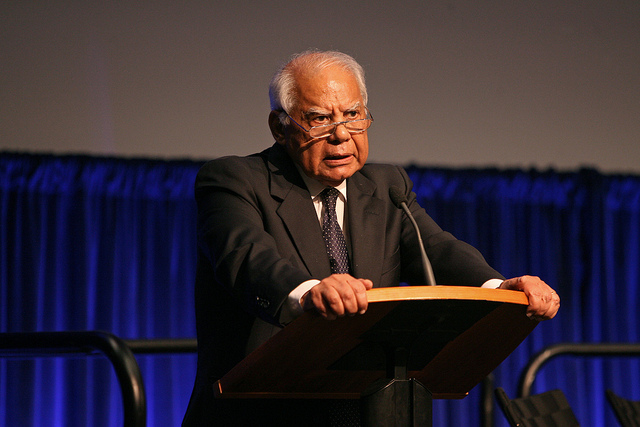
Since Mohamed Morsi’s ouster on July 3, the Egyptian political debate has centered on the appointment of the interim prime minister. Many names were floated over the last few days including, National Salvation Front leader Mohamed ElBaradei, founding member of the Social Democratic Party, Ziad Bahaa-Eldin, and former finance minister Samir Radwan. The Salafi Nour Party, however, stood in the way of both ElBaradei’s and Bahaa-Eldin’s appointments. On July 9 a consensus candidate was found with Hazem el-Beblawi appointed as interim prime minister, with the Nour Party’s approval.
Hazem el-Beblawi, the fourth or fifth option in a list of prime ministerial candidates, a seventy-seven year-old prominent liberal economist and a critic of former president Mohamed Morsi’s economic policies, is a founding member of the Egyptian Social Democratic Party formed after the January 2011 revolution. He also writes a weekly column for state-run Al Ahram newspaper. He formerly served as the second minister of finance and deputy prime minister in Essam Sharaf’s transitional government, under the Supreme Council of the Armed Forces’ (SCAF) leadership. He was appointed on July 17, 2011 as part of a cabinet reshuffle.
However after only four months in the position, Beblawi resigned in December 2011 in protest of the infamous Maspero massacre in which up to twenty-eight Coptic protesters were killed by the military forces. Speaking just two days after the massacre, Beblawi said, “The government failed in its main responsibility, which is to provide security, and it should at least acknowledge its failure to give this issue the effort it needed and apologize.” His first resignation was rejected by SCAF in October but he resigned again in December ending his service as finance minister.
In 2012, Beblawi published a book titled “Four Months in the Government’s Cage” in which he highlights some of the most pressing economic issues Egypt was facing during his post-revolution stint in the finance ministry. In an extensive book review by Salma Mansour, she concludes, “In short, this book captures the tension between long term economic problems and urgent financial crises as well as the tension between what is economically correct and what is politically viable. Such tensions manifest themselves in the form of difficult choices facing policymakers, because a delicate balance must be struck between various goals.” Her words are a reflection of Beblawi’s economic prowess, a skill that Egypt’s new cabinet will undoubtedly need in the coming months.
At the 19th annual Economic Research Forum conference in March 2013, Beblawi chaired the panel discussion, “Islam, Democracy and Economic Development” in which he highlighted that the 2011 revolution had less negative impact on the Egyptian economy than was expected, while still recognizing the fragility of its current state. At the time he said, “The only way Egypt can move ahead is by increasing the productivity of the people by importing technology, making economic alliances, and most importantly by educating people about the problems.”
In a recent interview with Daily News Egypt, Beblawi criticized former president Mohamed Morsi’s economic policy, clearly outlining why it failed. “It has not been exactly successful, and it lacked clarity. President Morsi supposedly comes from a background with a different vision: an Islamic vision in economics, in politics, etc. He did not, however, provide any clear landmarks for this vision,” he said. While recognizing the existing economic problems that Morsi inherited, Beblawi emphasized that the former president did not prioritize the issues that should have been focused on, namely the budget deficit, increasing levels of foreign debt, and a lack of transparency in dealing with these matters. He went on to discuss the subsidy crisis in Egypt, emphasizing the fact that it consumes 25 percent of the budget and is fundamentally unsustainable for the Egyptian economy. He ended the interview stating that what Egypt needs most for the economy to flourish is simply political stability, which requires a “powerful legal system and an independent judiciary system.”
Prior to his leadership in the Egyptian government, Beblawi served as an advisor to the Arab Monetary Fund in Abu Dhabi from 2001. He served as undersecretary-general of the UN between 1995 and 2000, and was chairman of the Export Development Bank of Egypt from 1983 to 1995.
Starting his academic career at the Cairo University’s faculty of law in 1956, Beblawi became a professor of economics after receiving his doctorate from University of Paris. He taught at the universities of Cairo, Ain Shams and the American University in Cairo, as well as in Kuwait, California and Paris.
With Beblawi’s appointment as interim prime minister, one of Egypt’s greatest concerns is its suffering economy, exasperated and fluctuating with the ongoing political and security instabilities. Withstanding the pressures and needs of SCAF, the government, opposition parties, and the Egyptian people will be the ultimate test of Beblawi’s ability to lead during this transitional time. Unfortunately, many of the problems he faced internally and economically during his previous service as finance minister have not changed now, less than two years later, but in fact have worsened. However, Hazem el-Beblawi’s vision for Egypt’s economy, his commitment to social justice, and his sense of national duty could prove instrumental, provided there is consensus among political forces on a viable roadmap for Egypt’s path to democracy, and a genuine transfer of power to a civilian government. Statements made by the presidency indicate that Beblawi will offer ministerial posts to both members of the Muslim Brotherhood and the Salafi Nour Party in an attempt to create an inclusive government.
Photo: World Bank Photo Collection
Image: Beblawi.jpg
